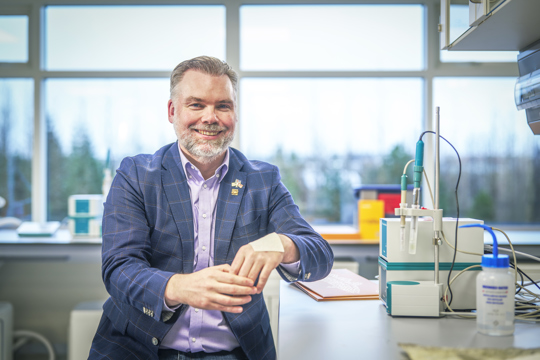Newsroom » News
Fertram Sigurjonsson Nominated for the European Inventor Award 2024

16. May 2024
According to the World Health Organisation (WHO) more than 60 million people in Europe have diabetes. The illness causes a decreased ability to heal wounds, leaving some patients with no alternative. A skin substitute from fish skin can help heal these wounds as well as many other severe and painful injuries, such as burns and surgery scars, more quickly and effectively. Icelandic inventor Fertram Sigurjonsson and his team have developed an advanced skin substitute using fish skin, which offers multiple advantages over competitor wound-healing products and re-purposes a waste product. Sigurjonsson and his team were selected from more than 550 candidates and are now finalists in the ‘Industry’ category of the European Inventor Award 2024.
Lattice-like scaffold on the skin
Due to the complex nature of skin and the available processes, wound healing has always been a challenging area. Even today, hundreds of thousands of people worldwide are left with decreased functionality, life-altering scars or worse, wounds that will not heal. Skin substitutes have emerged as a game-changer, using animal skin to create a lattice-like scaffold on the skin to form granulation tissue and trigger the creation of new blood vessels. Fertram Sigurjonsson and his Icelandic team have now taken these technologies to the next level by using cod fish skin as the basis for their technology and providing multiple benefits over the traditional mammalian-skin varieties. Because viruses can jump between mammals, skin substitutes sourced from mammals need to be treated with harsh chemicals to reduce the risk of disease transmission. That treatment denatures those materials and reduces their efficacy. Because there is no risk of disease transmission from fish to humans, the fish skin is only minimally processed, preserving its three-dimensionality, mechanical properties and chemical complexity as well as fats and omega acids which contribute to healing.
“Just like humans, fish skin has epidermis, dermis and subcutaneous tissue. So evolutionarily, our skin is identical to fish skin apart from the fish skin having scales that have evolved into hairs on the human skin. It took us four years in the laboratory to develop a method to take the fish DNA out to prevent immune response when applied to the human body. We were able to develop a method to remove the DNA while preserving the chemistry and the structure of the skin so that the healing properties of the fish skin can be retained” Sigurjonsson explains.
Innovation originated in the ocean
In 2007, Sigurjonsson, armed with expertise in chemistry and engineering, took the first steps to realise his idea of using Omega3 rich fish skin to treat wounds and tissue damage. This led to the launch of this pioneering product in 2013, which eventually culminated in a solution that a systematic review published by the National Library of Medicine describes as “an acceleration of wound healing, reduction in pain and necessary dressing changes as well as treatment-related costs and improved aesthetic and functional outcomes compared to conventional treatment options”.
On July 7, 2023, Coloplast announced its acquisition of Kerecis in a deal worth up to EUR 1.2 billion. This landmark acquisition made Kerecis Iceland’s inaugural business unicorn.
Together, Sigurjonsson and his team have been named one of the finalists in the ‘Industry’ category for this year’s European Inventor Award, which recognises outstanding inventors with inventions patented in Europe. The other finalists in this category are Ulf Landegren and Simon Fredriksson from Sweden, for their work in molecular diagnostics enhancing disease detection, and the team of Fiorenzo Dioni from Italy and Richard Oberle from Germany for their advancements in aluminium casting technology that reduces carbon emissions in automotive manufacturing. The EPO will announce the winners of the different categories during a ceremony live-streamed here from Malta on 9 July 2024. In addition, the EPO will reveal the Popular Prize winner, chosen by online public vote. Voting will remain open until the day of the ceremony.